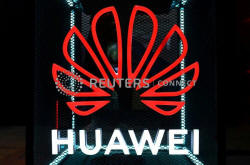Huawei's new phone lacks Google access after U.S. ban
 Send a link to a friend
Send a link to a friend
 [September 19, 2019] By
Douglas Busvine [September 19, 2019] By
Douglas Busvine
FRANKFURT (Reuters) - Huawei [HWT.UL]
launches what could be the world's smartest 5G phone on Thursday, but
its fate in Europe will hang on whether customers will buy a device
lacking access to software and apps supported by Google.
The Chinese telecoms giant will showcase its Mate 30 range in Munich,
Germany, in its first unveiling of an all-new phone since President
Donald Trump hit the Shenzhen-based company with an export ban in May.
"The launch will be the most watched ever," said telecoms and media
analyst Paolo Pescatore.
"Despite all the concerns surrounding Huawei, and the challenges it
faces, it remains defiant and prepared to soldier on."
Washington effectively banned U.S. firms from supplying Huawei in May,
alleging the Chinese firm is a national security risk as its equipment
could be used by Beijing to spy, which Huawei has repeatedly denied.

The No.2 smartphone maker expects the U.S. ban to cost it $10 billion.
Huawei's new phone launch has been marked by uncertainty over whether
buyers of the flagship Android device will be able to use apps supported
by Google <GOOGL.O>, a unit of Silicon Valley giant Alphabet <GOOGL.O>.
Holding the launch in Europe underlines the importance of the region's
500 million consumers to Huawei. It lost five percentage points in
market share here following the U.S. ban, even as buyers rallied to its
brand at home.
Huawei has been running an online marketing campaign
https://consumer.huawei.com/en/
campaign/mate30, with the slogan "Rethink Possibilities", recruiting
fans to spread the word about the launch. The same website will
livestream the event, which starts at 2 pm (1200 GMT).
UNBOXED DELIGHT
The Mate 30 range will run on an open-source version of Android - and
not on the current version licensed from Google, a source familiar with
the matter said.
[to top of second column] |

The Huawei logo is pictured at the IFA consumer tech fair in Berlin,
Germany, September 5, 2019. REUTERS/Hannibal Hanschke/File Photo

The smartphones will not be able to use Google Mobile Services to use the Play
Store and download apps like Gmail, Youtube or Maps. Instead, Huawei will offer
its own interface that will allow users to access some Google apps.
Without those, say analysts, consumers won't want the phone - unless Huawei can
find a way to convince them that its features are unmatched and the alternative
software offering is stable and easy to use.
Huawei says the phone's 'brain' - the Kirin 990 chipset unveiled at a recent
tech fair in Berlin - outperforms the Qualcomm-powered <QCOM.O> 5G phones
already on the market from market leader Samsung <005930.KS>.
In particular, the 'big core-tiny core' configuration of the hardware means it
can run power-hungry applications like artificial intelligence or support online
gaming, while saving battery on routine tasks.
The Mate 30 range's look and feel will be superior to Apple's <AAPL.O> new
iPhone 11s, according to analyst Richard Windsor, who said leaked photos showed
an attractive circular triple-camera set-up.
"Huawei has Apple soundly beaten when it comes to form factor design but even
these beautiful-looking devices are going to struggle to see any volume without
the Google ecosystem," Windsor said in a note.
Analysts are keen to learn when the phone will actually ship and how the pricing
of the top-end Mate 30 Pro compares with Samsung's Galaxy S10 5G, which retails
at $1,299, and the iPhone 11 Pro that starts at $999 but lacks 5G connectivity.
Huawei is expected to showcase the Mate 30 Pro, the Mate 30 and Mate 30 Lite -
in line with its existing marketing strategy that targets buyers on different
budgets. The phones would come in both 5G and 4G versions.
(Reporting by Douglas Busvine; Editing by Elaine Hardcastle)
[© 2019 Thomson Reuters. All rights
reserved.] Copyright 2019 Reuters. All rights reserved. This material may not be published,
broadcast, rewritten or redistributed.
Thompson Reuters is solely responsible for this content. |